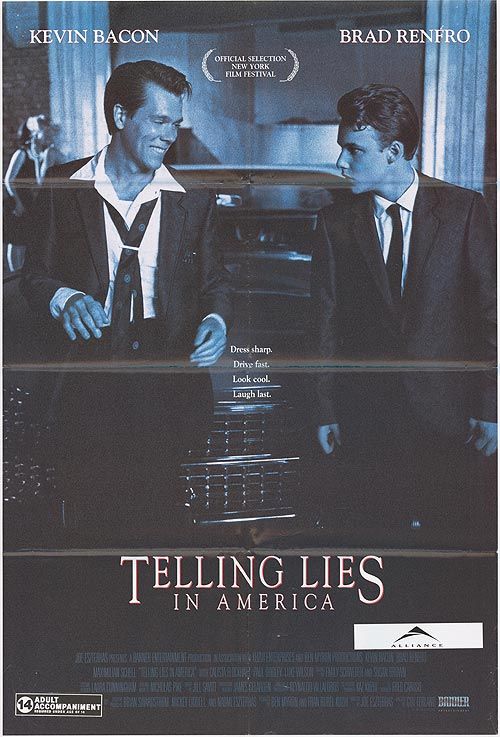"Lies About Lying"

| None | Light | Moderate | Heavy | |
|---|---|---|---|---|
| Language | ||||
| Violence | ||||
| Sex | ||||
| Nudity |
What You Need To Know:
This movie reveals the morally ambiguous background of its screenwriter, a man who has made some of the most immoral movies of all time. Because he is ashamed of his poor background, Karchy lies constantly to make himself look better. He is even a vandal and a fornicator. TELLING LIES IN AMERICA implies that all this immorality is okay
Content:
(HHH, C, LLL, V, SS, N, A, D, M) Strong humanist worldview of cheating & telling lies with some Christian elements; 20 obscenities & 15 profanities; mild violence such as bullying & fist-fighting; implied fornication with a prostitute, another instance of implied fornication & some sexual talk; upper male nudity & women in underwear; alcohol use & underage drinking; smoking; and, miscellaneous immorality including many instances of lying, pretending to be priest in confessional, vandalism, & urination.
More Detail:
Screenwriter Joe Eszterhas is perhaps best known for his salacious and raunchy screenplays including JADE, BASIC INSTINCT and SHOWGIRLS. In TELLING LIES IN AMERICA, Mr. Eszterhas pens a nostalgic, semi-autobiographical story set in his hometown of Cleveland in the early 1960s. Though obviously heartfelt and personal, it is a slow-moving, dull and morally ambiguous tale of a Hungarian boy looking for love, acceptance and naturalization in America.
Rising star Brad Renfro stars as Karchy Jonas, a senior in high school who is seeking acceptance from his peers. He gets very little because he speaks English improperly and is poor. Karchy’s only family is his literature professor father, Dr. Jonas (Maximilian Schell), who also seeks to become an American citizen. When Karchy isn’t in school, he helps his father pay the bills by working at a local grocery store and talks with a pretty but older female co-worker, named Diney (Calista Flockhart).
Karchy likes Diney and keeps asking her out. She tells him she will go out with him when he becomes a member of the WKH hall of fame. Membership is limited to those high school students who are nominated by their classmates. Karchy nominates himself many times and gets to meet the famous WKH disc jockey, Billy Magic (Kevin Bacon). The two admire each other. Karchy likes Billy’s slick and assured nature, while Billy is impressed with Karchy’s canny ability to lie. Billy knows that Karchy forged his nominating cards, but Billy never confess that he did.
Billy hires Karchy to help out at the studio and starts paying him very well. Soon, Billy is buying beer for Karchy, letting him drive his Cadillac and even soliciting a prostitute for Karchy. Occasionally, men come to visit Billy and ask Billy to listen to their newly discovered musical act. They offer Billy illegal payola to play the record of their new talent on the airwaves. All the while, Karchy is oblivious to his swindling boss. The only thing that could be better for Karchy is if Diney would return his affections.
Diney does go out on a date with Karchy, but she gets mad at him when she gets sick from an aphrodisiac that he slips into her milkshake. Though Karchy apologizes, it is too late, and Diney accepts a marriage proposal from the head grocer. Things get worse when Karchy gets himself thrown out of Catholic school just days before graduation for impersonating a priest in a confessional booth.
Ultimately, police question Karchy, and he learns that Billy is a crook. In the climax, Karchy testifies before a court, where he must decide to tell the truth and better his chances of becoming an American citizen, or lie and keep his friendship with Billy.
This semi-autobiographical movie reveals the morally ambiguous background of its screenwriter, Joe Eszterhas, a man who has penned some of Hollywood’s most immoral movies. Karchy lies all the time. He is ashamed of his poor background and lies to make himself look better. He is even a vandal and a fornicator. He is attracted to slick hucksters and lies in court to cover his swindling boss. This aspect alone will not endear the movie to many Americans. In the end, the judge takes Karchy aside, and together they determine that the story of George Washington chopping down the cherry tree and not telling a lie is a bunch of malarkey. While that piece of Americana may be legend, the movie seems to be making the point that America was founded by a liar, and hence the American legal system can be manipulated to accommodate anybody’s desires.
The movie does have impressive art direction, and the period music from the 1960s adds credibility, but all other production credits are only passable. Kevin Bacon does well with a fairly one-dimensional character, but Brad Renfro doesn’t grow as he plays the bad boy once again. TELLING LIES IN AMERICA was one of the first screenplays that Eszterhas wrote. He pulled it out of the closet at the prodding of his wife. He should have left it in there.



 - Content:
- Content: 



